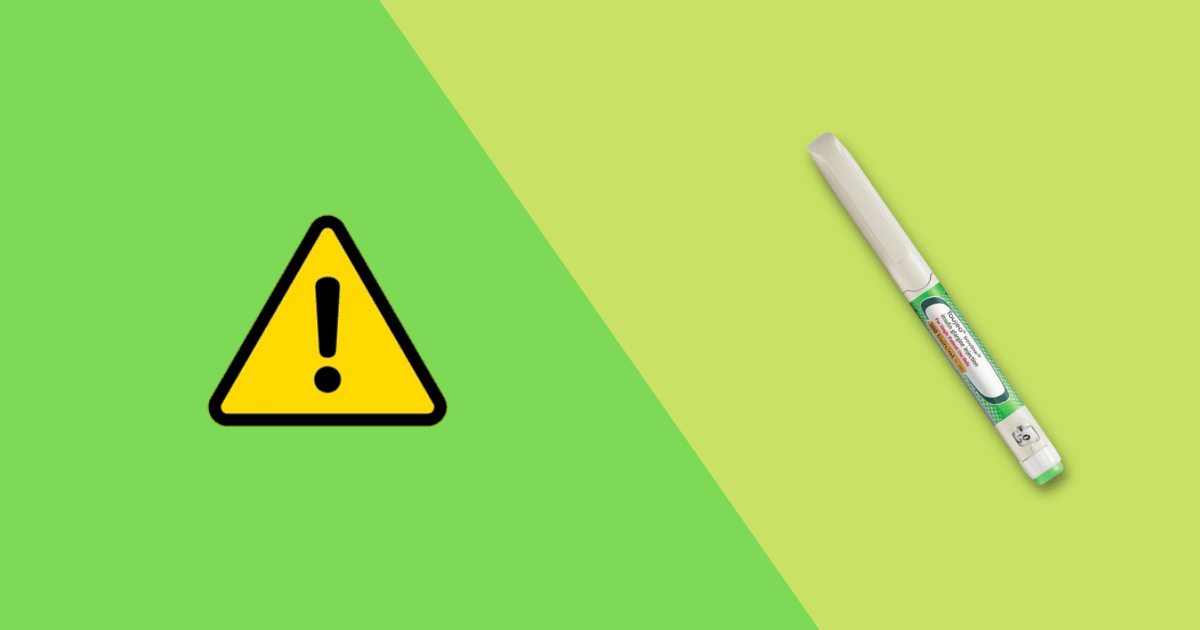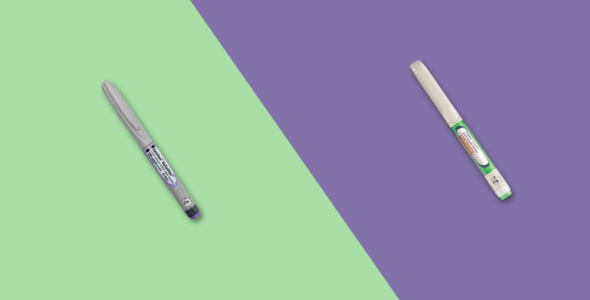Toujeo side effects and how to avoid them
Table of contents
Toujeo Solostar is an FDA-approved brand-name medication manufactured by Sanofi-Aventis. It is classified as a long-acting type of insulin used to reduce high blood sugar levels in adults and pediatric patients 6 years of age and older with diabetes mellitus. While Toujeo is generally well tolerated, there are some potential side effects that people should be aware of. The most common side effects of Toujeo include injection site reactions. Less common but more serious side effects can include allergic reactions.
Learn more about the side effects of Toujeo and what you can do to avoid them.
What is Toujeo (insulin glargine)?
Toujeo SoloStar (insulin glargine) is a long-acting insulin used along with diet and exercise to help treat hyperglycemia (high blood glucose levels) in adults with both type 1 and type 2 diabetes mellitus (T2DM) and type 1 diabetes mellitus (T1DM) in children 6 years of age and older. Toujeo SoloStar is not approved to treat diabetic ketoacidosis.
Toujeo SoloStar (insulin glargine) is a biological medication similar to naturally made (endogenous) insulin. The main activity of insulin, including Toujeo, is to regulate glucose metabolism. It does this by stimulating the uptake of glucose into skeletal muscle and adipose tissue (fat). Toujeo SoloStar also prevents glucose production in your liver.
More information on what is Toujeo
Toujeo dosage
Toujeo is available as 300 units of insulin glargine per milliliter in 1.5 mL Toujeo SoloStar prefilled insulin pens and 3 mL Toujeo Max SoloStar prefilled pens.
- Toujeo SoloStar is typically given as an injection under the skin (subcutaneous) of your thighs, upper arms, or stomach area once daily. It can be given at any time of the day but should be given at the same time every day. Do not reuse needles. Use a new needle with each Toujeo SoloStar injection. Reusing needles can lead to a serious infection or cause you to get the wrong insulin dose.
- Dispose of your used pen needles in a sharps container or a hard plastic container with a secure lid. Do not throw used needles away in your household trash.
- Rotate your injection site with each dose of Toujeo SoloStar. You can use the same area of the body but not the same spot.
- You should not use Toujeo SoloStar in an insulin pump or inject Toujeo SoloStar intravenously (in your vein). Do not mix Toujeo SoloStar with other insulin products.
- You can use your Toujeo SoloStar pen for up to 56 days after its first use. New Toujeo pens can be stored in the refrigerator between 36°F and 46°F (2°C and 8°C) until their expiration date. Do not freeze Toujeo SoloStar or use it if it has been frozen. After the first time you use your Toujeo SoloStar pen, you can keep it at room temperature up to 86°F (30°C) away from direct heat and light. Do not put your pen back in the refrigerator after it has been out. Your new or used Toujeo SoloStar pen should be stored with the pen cap on.
You are advised to read the medication guide provided with this medicine for the drug information and patient information, and always speak with your healthcare provider for medical advice about any changes to your dose so they can monitor and evaluate your condition.
What is the best time to take Toujeo?
Toujeo may be used at any time of the day or night but at the same time every day.
How much Toujeo is too much?
There is no maximum recommended dosage for Toujeo. But the maximum dose per injection is 80 units of insulin.
Is Toujeo a good insulin?
Toujeo offers consistent blood sugar levels, which reduces the risk of low blood sugar. Those using Toujeo are 60 % less likely to have severe hypoglycemia than those using Lantus.
Toujeo side effects
The most common possible side effects of Toujeo include:
- Low blood sugar (hypoglycemia)
- Injection site reactions
- Pruritis (itching)
- Skin rash
- Weight gain
- Painful or difficult urination
- Edema
- Lipodystrophy (pitted or thickened skin)
Toujeo can cause more serious side effects, including:
- The risk of life-threatening severe hypoglycemia is increased with changes to your daily dose of insulin, diet, or amount of physical activity. You are also at an increased risk if you add additional diabetic medications such as short-acting insulins. Make sure you are familiar with the symptoms of hypoglycemia, which include tremors, nervousness, fast heartbeat, sweating, blurred vision, confusion, drowsiness, and extreme hunger.
- Increased risk of low potassium levels (hypokalemia)
- Increased risk of fluid retention and heart failure when this medication is used along with thiazolidinediones (TZDs) such as Actos (pioglitazone)
- Serious allergic reactions, including hives, angioedema, trouble breathing, and shortness of breath
If you experience any of these serious side effects, stop taking Toujeo and seek medical attention immediately. You are encouraged to report the negative side effects of prescription drugs to the FDA. Visit www.fda.gov/medwatch, or call 1-800-FDA-1088.
Does Toujeo cause weight loss or weight gain?
Toujeo may cause weight gain, a common side effect of Toujeo.
Can Toujeo cause heart failure?
Toujeo can cause heart failure if taken with thiazolidinediones (TZDs). Speak to your healthcare provider for medical advice if you are using both treatments.
Does Toujeo cause joint pain?
No, joint pain is not a side effect of Toujeo.
Can Toujeo cause a yeast infection?
No. Yeast infections are not a known side effect of Toujeo.
Toujeo drug interactions
When Toujeo SoloStar is taken with other medications, it can change the way they work or increase the frequency and severity of side effects. Make sure your doctor is aware of all prescription drugs, over-the-counter medications, vitamins, and herbal supplements you take, including:
- Other diabetic medications, such as metformin
- Beta-blockers
- Diuretics
- Corticosteroids
- Atypical antipsychotics
Toujeo contraindications
Don’t take Toujeo if:
- Hypersensitivity to Toujeo SoloStar or any of its inactive ingredients.
- Are having an active episode of hypoglycemia (low blood sugar level) or diabetic ketoacidosis.
Talk to your doctor before taking Toujeo if you:
- Have liver or kidney problems
- Heart failure or other heart problems
- Are taking thiazolidinediones (TZDs)
- Are pregnant, plan on becoming pregnant, or are breastfeeding
You should always check with your doctor or pharmacist before taking any medication, including Toujeo, to make sure it is safe for you.
How to avoid Toujeo side effects
The best way to avoid side effects is to take Toujeo as directed by your doctor. Follow your doctor’s instructions carefully, and do not take more or less than prescribed.
If you experience any side effects, talk to your doctor or pharmacist. They may be able to recommend ways to help reduce or prevent some of the side effects.
1. Stick to the recommended dosage
Take your prescribed dose of Toujeo recommended by your healthcare professional. Do not take more or less than prescribed.
2. Monitor your blood sugar levels
If you have diabetes, it is important to monitor your blood sugar levels closely while taking Toujeo. Check your blood sugar levels as directed by your doctor and report any changes to your doctor immediately.
3. Drink plenty of fluids
Drink eight to 10 glasses of water or fluids every day to help prevent dehydration, which can make side effects worse.
4. Avoid alcohol
Avoid drinking alcohol while taking Toujeo, as it can increase your risk of hypoglycemia.
5. Don’t skip meals
Eating regular meals and snacks will help to prevent low blood sugar levels (hypoglycemia).
6. Check your feet
If you have diabetes, check your feet for any cuts, sores, or redness regularly. Tell your doctor if you experience any problems with your feet while taking Toujeo.
7. Know the signs and symptoms of Toujeo side effects
Signs and symptoms of side effects include hypoglycemia. If you experience any of the symptoms of hypoglycemia, speak to your doctor for medical advice.
8. Tell your doctor about all medications you’re taking
Be sure to tell your doctor about all other medications you’re taking, including over-the-counter drugs, vitamins, and herbal supplements, as they can interact with Toujeo.
9. Get regular medical checkups
It is important to get regular medical checkups and monitor your medical conditions. Your doctor will monitor your condition and may adjust your dose of Toujeo as needed.
Medically reviewed
A medical professional has reviewed this article.


Jamie Winn, PharmD
Jamie Winn, PharmD
Dr. Jamie Winn received his Doctor of Pharmacy in 2002 from the University of South Carolina College of Pharmacy, Columbia, SC. Jamie is a medical reviewer for NiceRx.


